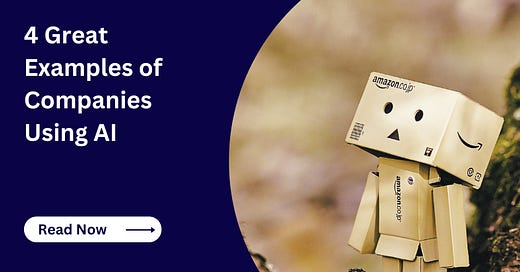In the AI Business Report, we talk extensively about what artificial intelligence could do for businesses. However, with 73% of businesses already using or planning to use AI in the future, today, we’re going to take a brief look at how popular companies are leveraging the technology’s benefits to enhance their operations.
1. Expedia
Travel booking website Expedia, which garners over 600 million monthly website visitors, has taken their business to the next level by implementing a conversational AI assistant that helps users book hotels and vacation experiences. As a result, users can plan their holidays by talking with Expedia’s AI assistant rather than simply searching the site.
Not only can users explain to Expedia’s assistant their travel requirements, such as the number of hotel rooms, preferred country, and must-have activities, the AI assistant also automatically creates a short list of attractions it thinks the user will enjoy based on their conversation.
2. Duolingo
To help users learn over 100 languages, including specialist dialects like Yiddish and High Valerian from House of the Dragon, Duolingo utilizes artificial intelligence to generate lessons tailored to the user's level, ultimately improving their weak spots. The language learning app also uses AI to check users' responses through deep learning techniques and voice recognition.
AI is not a new feature to Duolingo. However, the app recently introduced a ChatGPT-driven version that allows users to speak with Duolingo in the language they’re learning as if talking with a native speaker. The Duolingo AI chatbot helps users fine-tune their language ability and gives them a chance to practice conversing with what-would-be a real person.
Read More: How Duolingo Uses AI to Help People Learn New Languages
3. Coca-Cola
This year, drink manufacturer giant Coca-Cola formed a partnership with consultation and marketing agency Bain & Company, which has a “service alliance” with OpenAI–the creators of ChatGPT. The aim of this partnership is to use ChatGPT technology to deliver personalized customer experiences and improve marketing capabilities.
The technology will be used in combination with the DALL-E image tool to create personalized ad copy, images, and messaging. While it’s still unclear how using AI has affected Coca-Cola’s business, it’s likely to have at least optimized its marketing process.
4. Freshworks
Freshworks, a cloud-based customer service software company that focuses on business solutions, has also adopted AI technology, successfully reducing complex software development time from 10 weeks to less than one.
The company utilizes generative AI, like ChatGPT, to create strings of code across multiple programming languages, such as Python, C++, and JavaScript. Combined with expert human oversight and code, generative AI is perfect for optimizing development processes.
Where Are the Small Businesses?
You may have noticed that the above four companies are large entities. We didn’t forget about smaller companies, but information on specific small businesses using AI is scarce. However, considering the statistic at the start of this article, as well as the fact that 99.9% of American businesses are categorized as “small,” it’s obvious that small companies are getting their AI fix, too.
Thanks for reading.
If you enjoyed this article, please subscribe to receive email notifications whenever we post.
AI Business Report is brought to you by Californian development agency, Idea Maker.



